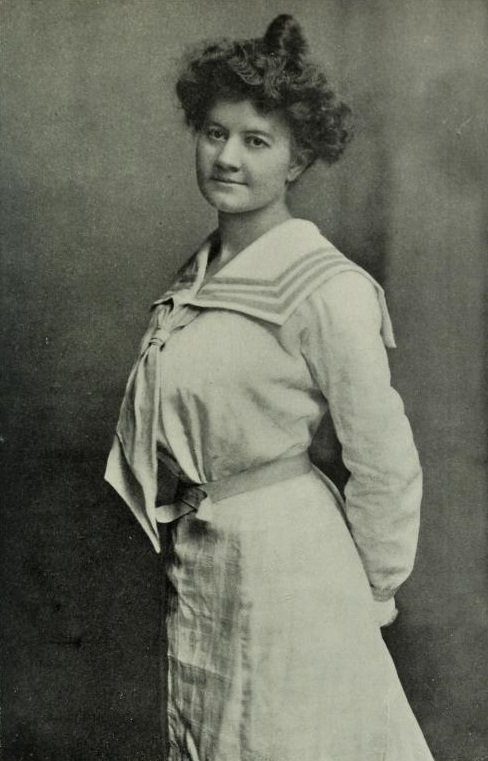76 Ellen Glasgow (1873 – 1945)
Amy Berke; Robert Bleil; Jordan Cofer; and Doug Davis

Wikimedia Commons
Public Domain
Ellen Glasgow was born in 1873 to a wealthy Virginia family. Her father was a successful owner of an ironworks company in Richmond, Virginia. Glasgow’s mother, who bore ten children, became an invalid, suffering from a variety of nervous disorders. Glasgow was educated at home, and she exhibited intellectual independence from a young age. She read widely in her father’s library, tackling subjects from literature to philosophy and political theory. Glasgow began her own foray into fiction writing and was immediately successful. In novels such as The Descendant (1897), The Deliverance (1904), Virginia (1913), and Barren Ground (1925), Glasgow predicted the first wave of the Southern Renaissance as she rigorously chronicled the death of the Old South, as well as rebelled against the contemporary artifice and restrictions of Victorian gentility. Barren Ground, in particular, established her reputation as a writer who moved beyond the styles of the Realist and Naturalist in the 1890s more fully into the temperament of the Modernist and feminist writer. Glasgow continued writing until her death, publishing later works such as The Sheltered Life (1932), Vein of Iron (1935), and In This Our Life (1941), which won the Pulitzer Prize for the novel in 1942. While she had love interests during her life, Glasgow remained single, valuing her independence. During her life, Glasgow suffered from a variety of illnesses and ailments, including heart disease. She died in her sleep at home in 1945.
Ellen Glasgow changed the course of Southern literature in the 1890s in her striking departure from traditional Southern literary fare dominated by Thomas Nelson Page’s fictional accounts of the plantation myth. Like literary Naturalists such as Frank Norris and Jack London, Glasgow absorbed ideas from Charles Darwin’s works and became one of the first Southern writers of substance to incorporate Darwinian themes in her fiction. She was influenced by Darwin’s views on heredity and environment as factors that strongly determined human behavior. As a young writer, she fearlessly confronted uncomfortable truths about human nature, eschewing the ever popular “moonlight and magnolias” fictional representation of life in the South and calling for more “blood and irony” in Southern fiction. She heeded her own call, producing a strong body of work that dealt with a variety of realistic, naturalistic, and even modernist, themes: women confronting their own biological impulses, social classes in conflict, women deconstructing social codes as artificial barriers to self-determination, rural farming families at odds with new industrialization and urbanization, and the transition of the Old South into the New South. Throughout her fiction, illusions about the present are shattered under the intense light of reality, and nostalgia for the past is revealed as a form of “evasive idealism,” a way of thinking that Glasgow deplored. In “Dare’s Gift,” one of many stories that Glasgow wrote about seemingly haunted dwellings, Glasgow explores the residual “haunting” of the present by the past, particularly by a past infected with the actions of a woman whose loyalty to an abstraction or dogmatic creed supersede her loyalty to her fiancé.

